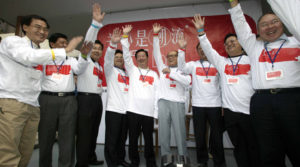(December 26, 2004) Hong Kong and Shantou) Mr. Li Ka-shing today called on all Chaozhou natives to unite and help establish a new model for medical relief in mainland China.
The Li Ka-shing Foundation has contributed RMB ten million to support the “Caring Is Hip” medical relief program proposed by Professor Dennis Lam, director of the Shantou University/Chinese University of Hong Kong Joint Shantou International Eye Center. The program, officially launched in Sanrao today, received strong support from the municipal governments as well as the Hong Kong Chiu Chow Chamber of Commerce, the Federation of Hong Kong Chiu Chow Community Organizations, Young Executive Committee of Hong Kong Chiu Chow Chamber of Commerce, and International Teo Chew Youth Federation.
The launching ceremony was attended by Mr. Li Ka-shing and other prominent Chaozhou natives, including Professor Lam, Dr. Ko Wing Man, who raised funds for the program, and Mr. Mathias Woo, who was in charge of design and promotion activities. They all shared Mr. Li’s vision of a compassionate and equitable society and made contributions in their own ways.
Mr. Li believes that “Caring Is Hip” is a viable and sustainable model for medical practice in rural villages. Establishing a platform and network for the delivery of quality medical services will provide people in need with the necessary means and resources to help themselves.
This virtuous cycle will help reduce dependence on government and public resources and enhance the capabilities of rural medical professionals. Members of the community participate by sharing their resources and making contributions to promote “Caring Is Hip” as a new social model for China.
At the ceremony, Professor Lam said non-profit satellite clinics will be set up in 20 rural medical facilities all over the Chaozhou-Shantou region within three to five years. Shantou University Medical College (SUMC) will provide specialist training for rural medical professionals, who will then return to their respective clinics to provide much-needed medical services for patients. The clinics aim to recover only its operating costs which means that services are expected to cost far less than those offered in large urban areas. The objective is to allow financially strapped families to afford quality medical care and services while enabling the program to develop on a sustainable basis.
Each clinic will be staffed by permanent health professionals. To enhance the quality of medical care at these clinics and to prevent the outbreak of rare diseases, SUMC will also assist in recruiting voluntary medical workers from Shantou, Hong Kong, and overseas to perform specialist treatments and surgery demonstrations.
The first clinic will be set up in the Sanrao district. The JSIEC will head this operation with the aim of eradicating all incidents of blindness caused by cataract in the Chaozhou/Shantou area within three to five years. Once the program is launched, other medical services will be added gradually.
Mr. Li said no government or political system can completely eliminate the existence of poverty. This is not a subjective opinion, but rather an objective fact. “The exact causes of poverty, whether it is systematic deficiency, or personal misfortune, are probably beyond the confines of our comprehension. Regardless of its causes, we cannot deny or ignore this escalating problem and its serious implications for society.
“The transfer of medical skills helps restore dignity by empowering people to help themselves. The capacity of human beings to care for one another makes up for some of the injustices and inequities of this world.”
A budget of RMB 20 million has been set for the first phase of “Caring Is Hip.” The Li Ka-shing Foundation is contributing RMB 10 million, the Chaozhou and Shantou municipal governments RMB 2.5 million each, and the remaining RMB 5 million will be raised by local governments and Chaozhou natives.
Engineering reforms in China’s healthcare system is difficult due to the country’s vast regions. However, inroads can be made if the residents of each region unite their efforts to make systemic changes.
Mr. Li said, “I hope other regions will take notice and launch similar programs. Then there is hope that the rural medical care problems that are so prevalent now can be improved. This is our collective wish.” On their way to Sanrao, Mr. Li told medical student volunteers that he is concerned that young people living in a materialistic society can easily neglect the needs of the underprivileged. While in Sanrao, Mr. Li passed out sporting goods to hundreds of school children.
“Caring Is Hip” is an innovative philanthropic program designed with the medical school playing a central coordination role, with contributions from medical specialists, and is complemented by a novel promotion campaign to raise community awareness. For more information, please visit http://caringiship.stu.edu.cn.

